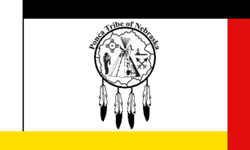
Back بونكا Arabic Понса Byelorussian Понка Bulgarian Ponca Catalan Ponca (indfødte amerikanere) Danish Ponca (Volk) German Ponca Spanish Ponkad Estonian Poncat Finnish Poncas French
 Flag of the Ponca Tribe of Oklahoma | |
 Flag of the Ponca Tribe of Nebraska | |
| Total population | |
|---|---|
| 6,700[1][2] | |
| Regions with significant populations | |
( | |
| Languages | |
| English, Omaha-Ponca | |
| Religion | |
| Native American Church, Christianity | |
| Related ethnic groups | |
| Dhegihan speaking people (Omaha, Kaw, Osage, and Quapaw) |
| People | Páⁿka |
|---|---|
| Language | Páⁿka Iyé, Páⁿka Gáxe |
| Country | Páⁿka Mazhóⁿ |
The Ponca people[a] are a nation primarily located in the Great Plains of North America that share a common Ponca culture, history, and language, identified with two Indigenous nations: the Ponca Tribe of Indians of Oklahoma or the Ponca Tribe of Nebraska.
This nation comprised the modern-day Ponca, Omaha, Kaw, Osage, and Quapaw peoples until the mid-17th century when the people sought to establish their nation west of the Mississippi River as a result of the Beaver Wars. By the end of the 18th century, the Ponca people had established themselves at the mouth of the Niobrara River near its confluence with the Missouri River, remaining there until 1877 when the United States forcibly removed the Ponca people from the Ponca Reservation in the Dakota Territory to the Indian Territory. This event, known as the Ponca Trail of Tears, resulted in the deaths of hundreds of Ponca civilians and the splintering of the nation. In 1879, two years after the removal, a small portion of the Ponca elected to return to Nebraska in 1879. This group, led by Standing Bear, ultimately gave rise to the present-day Ponca Tribe of Nebraska. Two years later, the majority of the Ponca were given the opportunity to return to Nebraska but elected against doing so, having established themselves on a new reservation in the Indian Territory. This group, led by White Eagle, ultimately gave rise to the Ponca Tribe of Oklahoma.
- ^ Oklahoma Indian Affairs. Oklahoma Indian Nations Pocket Pictorial Directory. Archived 2009-02-11 at the Wayback Machine 2008: page 28. Retrieved 8 August 2009.
- ^ Cite error: The named reference
newas invoked but never defined (see the help page). - ^ Dando-Collins,(2004)Standing Bear is a Person, p. 138. Da Capo, Cambridge, MA ISBN 0-306-81370-X.
Cite error: There are <ref group=lower-alpha> tags or {{efn}} templates on this page, but the references will not show without a {{reflist|group=lower-alpha}} template or {{notelist}} template (see the help page).
© MMXXIII Rich X Search. We shall prevail. All rights reserved. Rich X Search